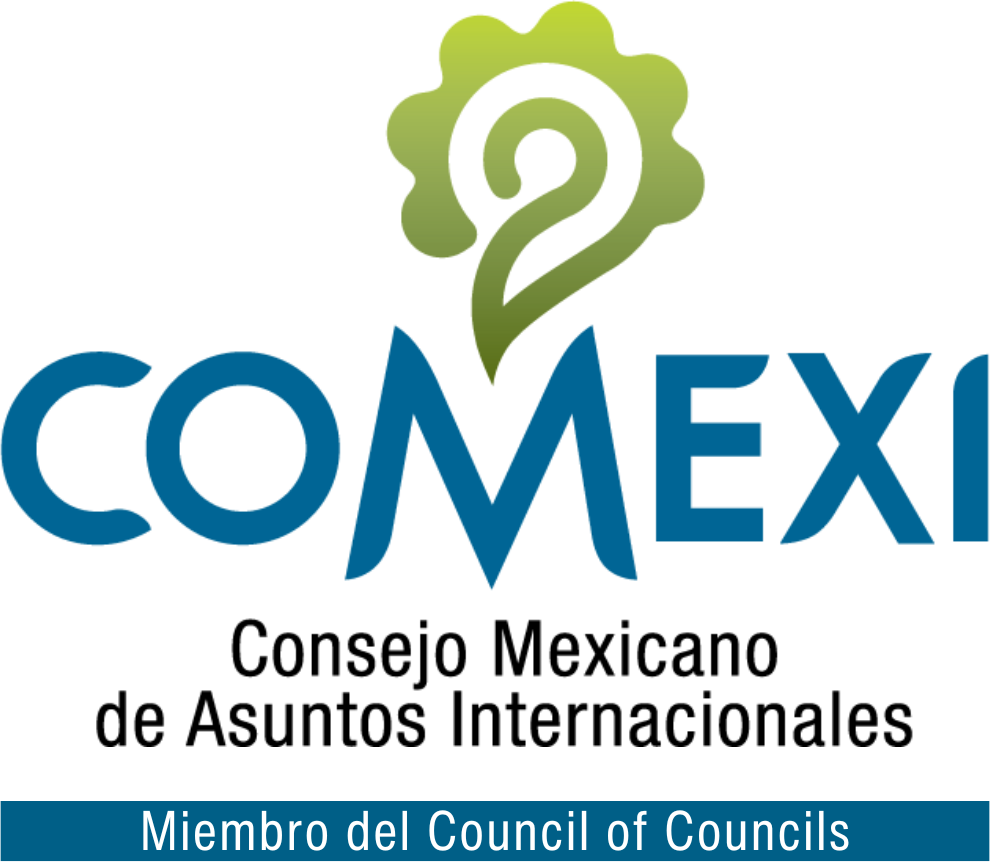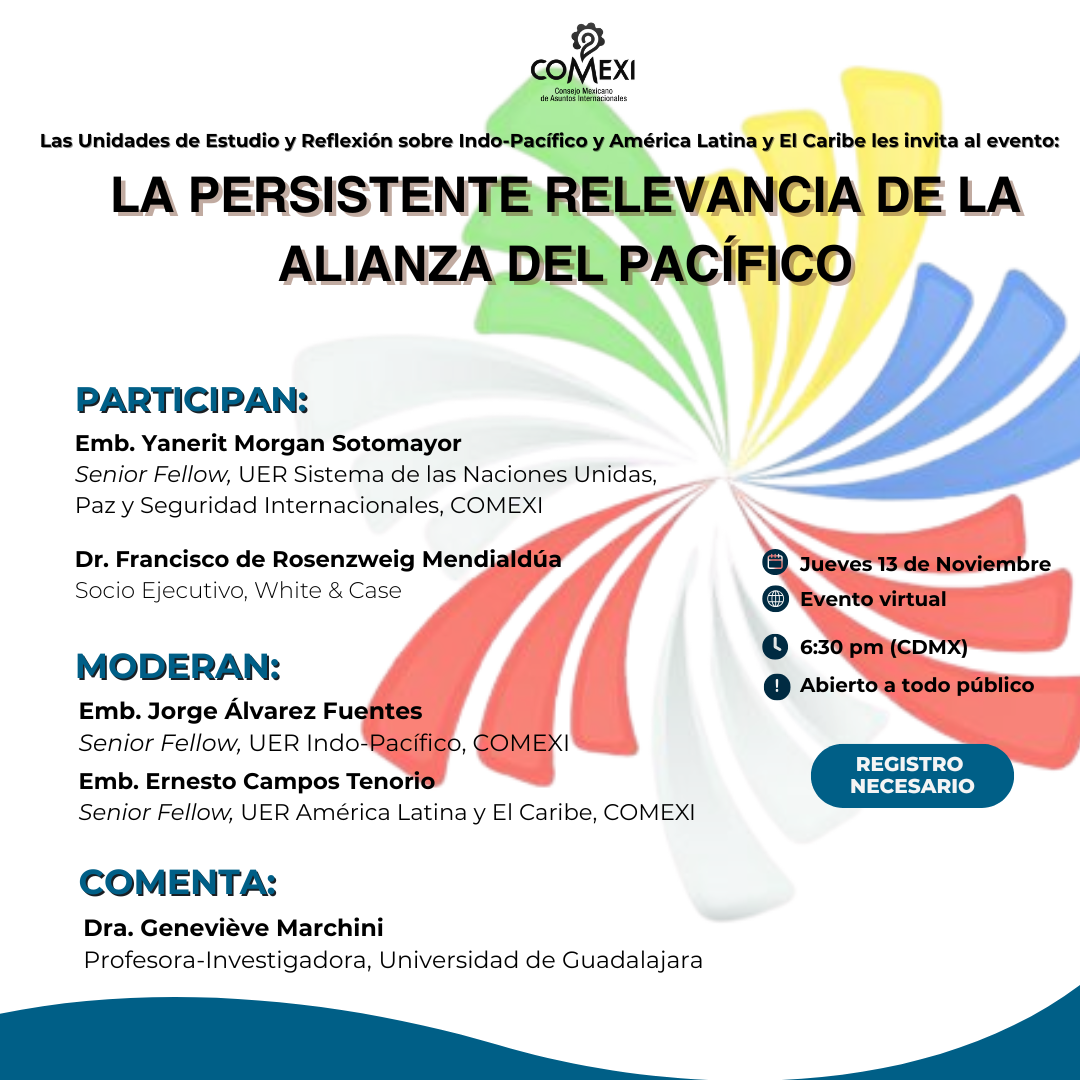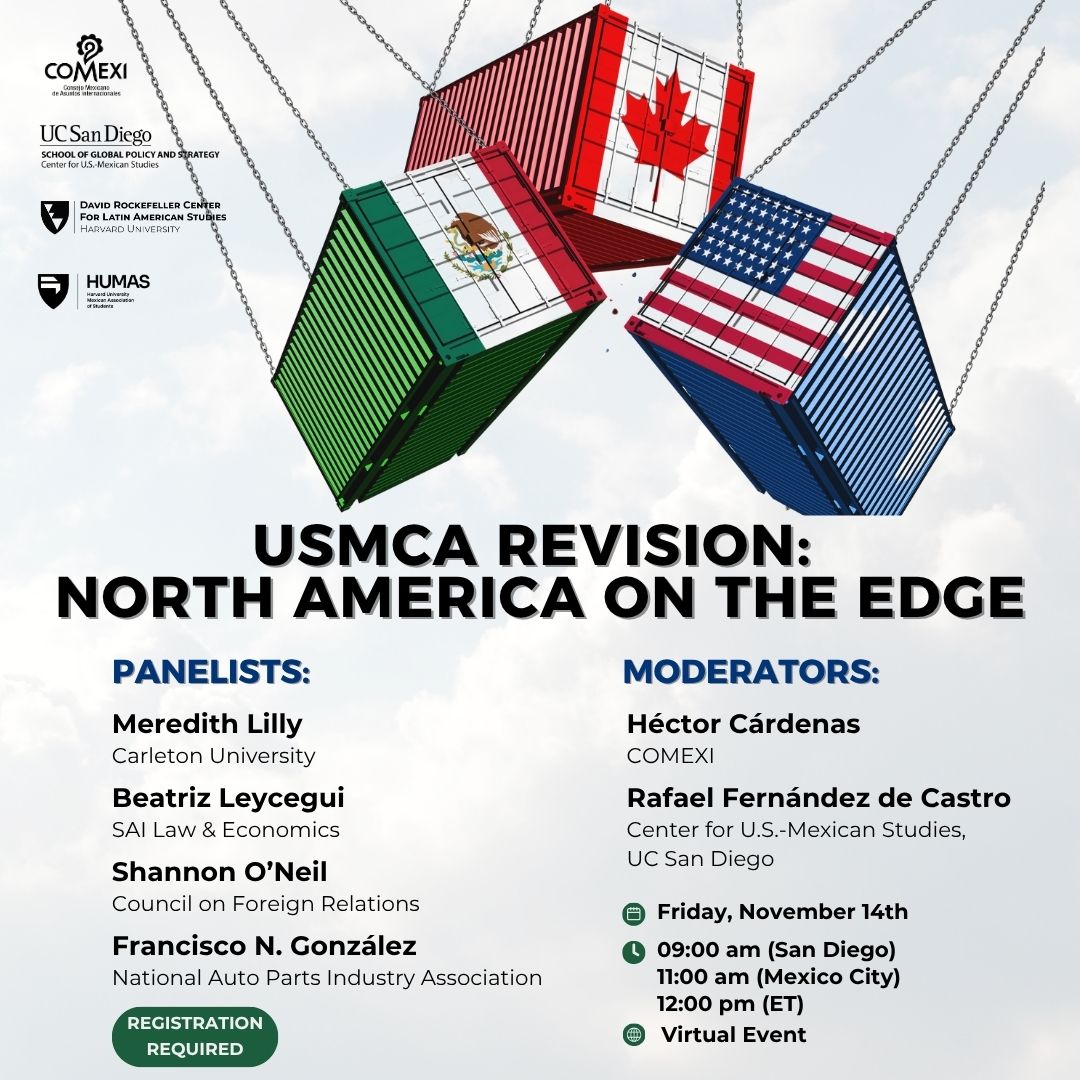The Mexican Council on Foreign Relations (COMEXI) presents the webinar “The future of Asia-Pacific: a perspective from New Zealand”.
This webinar took place on December 8th, 2020 and belongs to the series "Quarantine webinars". This webinar features Amb. Mark Sinclair, Ambassador of New Zealand to Mexico and Acting Deputy Secretary for Asia and the Americas, Ministry of Foreign Trade of New Zealand. This webinar was moderated by Dr. Leonardo Curzio, Researcher CISAN - UNAM and COMEXI Associate.
At the beginning of the conference Dr. Luis Rubio, President of COMEXI, starts mentioning the qualities that New Zealand has since their economic reforms in the beginning of the 1980´s and the exceptional management that they showed during the pandemic. He thanks the participattion of Ambassador Mark Sinclair in this webinar and proceeds with a brief introduction of the moderator Dr. Leonardo Curzio. Dr. Curzio introduces to the audience the impressive experience of Amb. Sinclair as an advisor of foreign policy and trade negotiation and his development as an ambassador to Japan and currently to Mexico.
Ambassador Sinclair begins his participation by pointing out the connections between New Zealand and Asia in regard of the economy, it's population of Asian origin, diplomatic and trade interests.
Amb. Sinclair continues mentioning that New Zealand has recently participated in Asian Summits, that brings together regional leaders from the association of South Asia, a group of North Asia and South-East Asia nations and the they will be hosting the 2021 Asia-Pacific Economic Cooperation (APEC) Summit.
On the other hand, Amb. Sinclair mentions the importance of New Zealand's perspective around Asia´s future due to its geopolitical position in trade. Considering the interests that Mexico has manifested in expanding its market and foreign relationships with Asia, both countries have a common objective in building stronger relationships in this region.
Amb.Sinclair mentions that New Zealand and Mexico are both members of the Trans-Pacific Partnership Agreement (TPP), and that they have similar interests around the Alianza del Pacifico in creating a more solid relationship as partners in the Asia-Pacific Regional Project. Both countries are facing a pandemic and economic crisis, developed in this continent, which highlights the importance of what it’s done in Asia. He explains that APEC represents 60% of international GDP, which is related to 50% global trade, and that it is estimated that by 2030, its population will represent 60% of the world’s middle class, making Asia the engine of growth for the rest of the world. He makes reference to how in 2020, it was estimated that the global GDP will drop around 4.5%, but for the APEC countries it is estimated around 2.5% and projections are more than 5% growth in 2021 for these economies. The key members of APEC had an amazing control on the pandemic effects which influence their own economic growth.
As the conference continues, Ambassador Sinclair states that New Zealand has maintained its exports to Asia during this year, and hopefully this will be one of the principal elements that will help their economy in 2021. He mentions the importance of crucial states such as China, Japan, Russia, Korea and their relationship with the United States for the stability and trade architecture of the region, and points out the relevance of climate change. He mentions that it has been five years since the Paris Climate Agreement was adopted and while China, Japan and Korea have commited to reach zero carbon emissions by the middle of the century, New Zealand has declared a climate change emergency, as well as Australia, which Ambassador Sinclair, hopes that the next US administration will join the green economic recovery.
After Ambassador Sinclair’s presentation, Dr. Leonardo Curzio starts the conversation with a plain question about the compatibility between the new alliances in Asia. Sinclair explains that a proliferation of trade agreements does not represent a problem, since each one involves different layers and with each generation they improve their quality.
Dr. Curzio continues the conversation by asking about the future of the US - Asia relations during Joe Biden’s government, around military and trade relationships. Ambassador Sinclair answers that we will have to look very closely at the democrats' comments and people around Mr. Biden and detect if the approach is going to be similar to the Obama administration.
The moderator continues and asks if there's a scenario in which China and the United States, as the world’s two largest economies, can work and cooperate together in the prosperity of the Pacific Rim. Amb. Sinclair mentions that they need each other. China remains the number one trade partner of the USA, so they are forced to collaborate together on different levels.
Dr. Curzio inquires if Mexico and New Zealand have a bilateral agenda, or if they just share regional projects. Ambassador Sinclair states that both countries have a huge interest in the Comprehensive and Progressive Agreement for Trans-Pacific Partnership (CPTPP), which brings huge opportunities for trade, investment and wellbeing for many members of the population in both countries.
The moderator continues with the conversation by asking if New Zealand will be expanding the Working Holiday Visa Program to Mexico, to which the Ambassador replies that they will have to discuss this topic in the context of an upgrade to the market access for members of the TPP agreement. Regarding a direct flight to Mexico, Amb. Sinclair mentions that they will have to verify, because, at least at the time being, New Zealand has suspended all their international flights, so it will take some time.
Dr. Curzio requests Amb. Sinclair to talk about the Regional Comprehensive Economic Partnership (RCEP) and the possibility that India might join this agreement. Ambassador Sinclair, mentioned that the RCEP is a huge negotiation between fifteen countries which represents an enormous trade facilitation among customs procedure, rules of origin and rejecting protectionism. In this scenario the politics among trade for India has always been very difficult, although it is emerging as a big player in services in technology and investment, therefore it might come up if it needs them.
After the conversation, Dr. Curzio begins the Q&A section with a couple of questions from Dr. Luis Rubio. He asks how important is China for New Zealand and how vulnerable they feel about their potential extortion.
Amb. Sinclair affirmed that China is one of the biggest markets and suppliers of imports for New Zealand, so they were the first Western county to establish a free trade trial with them in 2008, and later with Hong Kong and Taiwan. He adds that this vulnerability works both ways, as New Zealand is an important supplier for China and that they have maintained a cordial dialogue and bilateral diplomatic relationship.
Dr. Curzio requests Amb.Sinclair to talk more about New Zealand's Prime Minister. Sinclair declares that the Prime Minister, Jacinda Ardern, has a progressive agenda, and due to the fact that the government has razled with the pandemic, with the individual cases and the propagation of COVID-19 her leadership has been recognized worldwide. About the 2019 terrorist attack, the Prime Minister has declared a strategy in terms of social cohesion and collective responsibility, and instauring the value of diversity and making every person feel that they matter .
In terms of foreing policy concepts, Amb. Sinclair mentions that around constructive pragmatism, this can be interpreted for New Zealand as the ability to separate from its own interests and cooperate with the international community, regarding their concerns. About the idea of soft power and strategy, he says that for New Zealand this can be defined as maintaining a business environment that supports innovation and creativity.
The webinar concluded with some questions from the audience, asking around the odds that China will join the CPTPP, in which case the Ambassador mentions that this might be interpreted as a strategy from China partly motivated to send a message for the next US administration on options on managing trade tensions. Also, over the years China has adopted international processes to drive economic reforms inside their territory so this can also be a factor for them to join.
Talking about the Central American integration system, Amb. Sinclair says they feel remote from this topic, but it draws their attention to their development and indigenous model.
Concluding with the session Amb. Sinclair answers a question about the daily role of indigenous people in New Zealand and their involvement in political issues. He comments that there is an important number of indigenous maori members of their Parlament than ever before and in their economy the number of maori exportations is increasing.
Finally, Dr. Curzio thanks Ambassador Sinclair for his participation on the webinar, and the conference finishes with a message from the Executive Director of COMEXI, Verónica Ortiz, where she continues to thank the Ambassador for his insights about geopolitics in Asia and the potential of the bilateral relationship between Mexico and New Zealand.





